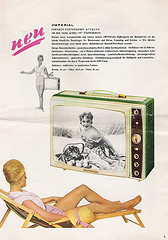For Some Reason, More Consumers Trust Ads Now Than They Did 6 Years Ago
According to the recent Global Trust In Advertising & Brand Messages survey from Nielsen, the number of consumers who trust various forms of advertising has increased between 2007 and 2013.
For example, 62% of respondents said they “completely” or “somewhat” trust TV ads. That’s up from 56% in 2007. Trust in ads shown before movies had an impressive 18 percentage point jump from 38% in 2007 to 56% in 2013.
In North America, word-of-mouth advertising is still the most trusted form, with 82% of respondents saying they trust it. We don’t imagine any form of advertising ever toppling the good ol’ recommendation from a friend.
The closest for North American consumers is online reviews, which had a trust rating of 68% on the Nielsen survey. That number is still far off the word-of-mouth mark, but as crowd-sourced reviews become more prevalent and consumers learn how to glean trusted information from them, we’d expect that the trust gap between what your real friends recommend and what an online hive-mind recommends will narrow significantly.
Also of interest is the fact that sometimes people are taking action in response to a form of advertising they don’t necessarily trust. The survey found that 61% of North American consumers trust TV ads, but 65% of them have taken action based on a TV commercial. Likewise, globally only 56% of consumers trust e-mail ads that they signed up for, but 65% of them are responding to those ads.
In terms of ad formats with the least amount of trust, look no further than whatever computer or mobile device you’re reading this story on.
In North America, text ads ranked the lowest, with only 27% of consumers putting their trust in these annoyances. We’re actually surprised that it’s that high, given that most of the text advertising we’ve seen is spam.
Banner ads are almost as poorly trusted — a mere 33% of North Americans saying they put any trust in them. Display ads on mobile devices fared slightly better with a 35% trust rating, while ads on social networks managed to convince 39% of respondents that they are trustworthy.
SEX DOESN’T SELL; NEITHER DO CELEBRITIES
When asked which types of ads resonate the most with them, survey respondents overwhelmingly said that “humorous” and “real-life situation” ads were the best.
At the bottom of the list were four things that one might normally assume consumers want to see: Athlete endorsements (8%), Celebrity endorsements (12%), Cars (13%), and Sexual (14%). Instead, these categories were beaten out by the likes of Value-Oriented ads (38%), Aspirational ads (24%), and ads featuring animals (18%). So people would rather laugh at cats than watch sexy celebrities try to sell them shaving cream. Duly noted.
Want more consumer news? Visit our parent organization, Consumer Reports, for the latest on scams, recalls, and other consumer issues.


